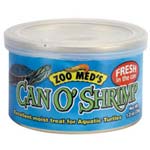Shrimp of various species play an important role in the natural diets of many freshwater fishes, and the nutrients they supply differ from those found in insects and other more commonly-used aquarium foods. Many native and exotic fishes under my care at home and in zoos prefer shrimp to all else, and do well when they are added to the diet. And while ocean krill (not a true shrimp) is readily available, I wonder about the long range effects of feeding a marine animal to freshwater fishes.
 Unfortunately, freshwater shrimps are difficult for the average aquarist to procure. I was, therefore, pleased when Zoo Med began offering canned freshwater shrimp. Although marketed as a reptile food, I have fed canned shrimp and find them to be some of the best foods for freshwater aquarium fish, showing great results. But I’ve been remiss in spreading the word among my hobbyist friends…if you decide to give them a try, please post your thoughts below, thanks.
Unfortunately, freshwater shrimps are difficult for the average aquarist to procure. I was, therefore, pleased when Zoo Med began offering canned freshwater shrimp. Although marketed as a reptile food, I have fed canned shrimp and find them to be some of the best foods for freshwater aquarium fish, showing great results. But I’ve been remiss in spreading the word among my hobbyist friends…if you decide to give them a try, please post your thoughts below, thanks.
An Important Consideration
Small, whole animals are used in Zoo Med’s canned freshwater shrimp product. This is preferable to offering our fishes small pieces of food market marine shrimp, which are usually missing nutritionally valuable internal organs (note: food grade shrimp are fine to use on occasion).
Canned Freshwater Shrimp
The species used in Zoo Med’s Can O’ Shrimp is the Oriental River Prawn (Macrobrachium nipponense), a freshwater shrimp that ranges from Myanmar through China, Korea, Japan and Taiwan. It would seem a more natural food source for freshwater fishes than is ocean-dwelling krill.
Canned shrimp are large enough to interest Oscars, Lungfish, Bluegill Sunfish and other sizeable aquarium denizens, yet crumble easily and so can be taken by tiny species as well. I also offer them to a wide variety of freshwater invertebrates, including crayfish, snails and diving beetles; African Vampire Shrimp especially enjoy chowing down on their smaller cousins!
Plum and juicy, these shrimp are ideal for fishes that are reluctant to accept freeze-dried foods and pellets. Live food specialists such as the Chain Pickerel, for example, will readily take “meaty” foods in place of live fishes. Bluegill Sunfishes, Bichirs and others also tend to refuse dry foods as they mature, even though such may be eaten by youngsters. Fishes that are bred for the pet trade, such as various Cichlids, usually accept pellets, but the enthusiastic responses to canned shrimp will leave no doubt as to their preference!
Canned Grasshoppers, Silkworms, Snails, Mealworms and Crickets
Terrestrial invertebrates form a large part of the diets of many freshwater fishes, but they have been largely overlooked by hobbyists and public aquariums alike. Fortunately, a number of species are now being marketed in canned form, for use with pet reptiles and amphibians. I’ve experimented with all as fish food, and am pleased with the results. Please see this article for further information.
Perhaps the unique nutrients offered by these foods will turn out to be critical in keeping or breeding certain delicate freshwater fishes, especially those which feed largely on invertebrates in the wild.
Fishing Bait
For those of you who enjoy fish on the plate as well as in the tank, I’m happy to report that canned invertebrates also make great, easy-to-store fish bait. I’ve found shrimp to be favored above all, at least here in the Northeastern USA, but all are worth trying.
 That Fish Blog – Aquarium Advice and Information
That Fish Blog – Aquarium Advice and Information


Hey there, You have done an excellent job. I will certainly digg it and personally suggest
to my friends. I am confident they’ll be benefited from this site.
Hello Trystan,
Thanks for the kind words, much appreciated!